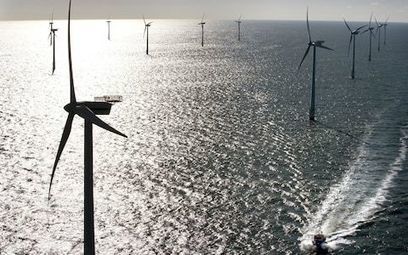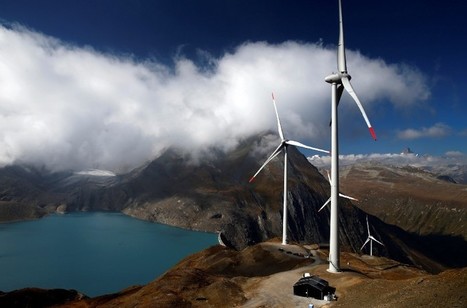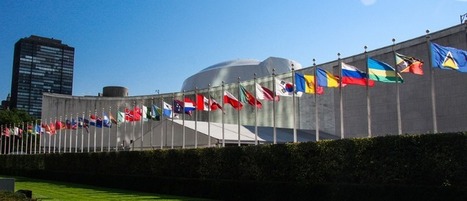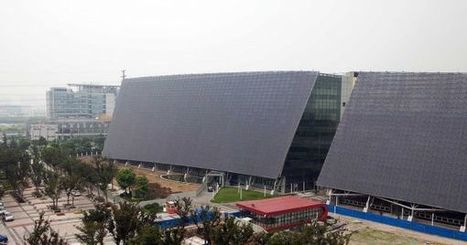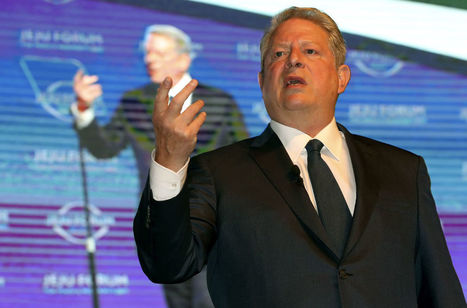 Your new post is loading...
 Your new post is loading...
New South Wales is the only state that has made meaningful progress on legislation and enforcement of standards capable of creating a sustainable built environment.
From data collection to gene editing to AI, what we once considered science fiction is now becoming reality. This hour, TED speakers explore the future consequences of our present actions.
he UK’s offshore wind sector could power a £17.5bn investment inthe UK economy over the next four years after faster than expected cost-cutting slashed subsidies for the technology by half.
The Government’s latest auction for support contracts, released on Monday, shows that offshore wind costs have halved in recent years to under £58 for every megawatt-hour of electricity produced, even lower than the estimates given by experts in the run-up to the results.
The lower costs mean more wind farms will be able to apply for the £294m funding pot, bringing an investment surge of £17.5bn into the UK. The boom is even greater than the £11bn predicted by Renewable UK as recently as last week.
The logic was flawed. Not only did America’s first colonists encounter dense, dark wilderness in the Northeast, their winters were freezing and summers dripped with humidity. Frequent, strong storms rolled in at a moment’s notice. They were shocked, disappointed, and dangerously unprepared.
Rather than adapt, a collection of scientists, doctors, and writers campaigned to deforest the land. In their minds, cutting down thousands of acres at a time would improve the weather. Whether they were “successful” or not really isn’t the point. The fact that American colonists and preeminent thinkers actually advocated climate change by mass deforestation is a stormy stain in scientific history.
Two turbines in the Pentland Firth set a world record for monthly production from a tidal stream power station, according to the project's developer.
Atlantis said its MeyGen scheme in the Inner Sound of the firth off the Caithness coast produced 700 MWh of electricity.
The company said this was enough power for 2,000 homes.
A recent OECD report finds that low and middle income earners have seen their wages stagnate and that the income share of middle-skilled jobs has fallen. Rising inequality has led to concerns that top earners are getting a disproportionate share of the gains from global “openness and interconnection”. This summer, the OECD Employment Outlook 2017 revealed that job polarization has been “driven by pervasive and skill-biased technological changes.”
Some types of pollution don’t hang around in the atmosphere very long; they break down through chemical reactions or wash out with the rain in a matter of weeks or years. Carbon dioxide, on the other hand, takes a very, very long time to naturally scrub away.
Even if we stop emitting more of it today, the concentration of carbon dioxide will stay high for centuries.
In a previous story, we looked at ways to intentionally cool the climate by doing things like injecting sunlight-reflecting particles into the upper atmosphere. That could potentially ease the effects of climate change.
Why are our universities still investing in the fossil fuel industry?
During our research to answer that question, we have found unsettling ties between our universities and the industry willingly risking our collective future for their corporate profits. Ties that can give this industry access to our university administration's ears while majority of students and staff are calling for fossil fuel divestment.
That is unacceptable.
Right now, we are giving our university administration one last chance: don't let the fossil fuel industry dictate our university from behind the curtain and disclose the ties now.
But if they don't, we'll do it for them.
Together we'll shine a spotlight on the fossil fuel industry and the toxic impact they have on our education, our environment and our future.
The next stage of humanity’s fight to reduce greenhouse emissions may revolve around seaweed, according to tonight’s episode of ABC’s Catalyst, presented by Professor Tim Flannery, which asks the question “can seaweed save the world?”
With the help of me and colleagues around the world, the documentary explores seaweed’s enormous potential to reduce greenhouse gases and draw CO₂ out of the atmosphere. In the case of seaweed, that could include giant kelp farms that de-acidify oceans, or feeding algae to cattle and sheep to dramatically reduce their methane emissions.
Work means everything to us Americans. For centuries – since, say, 1650 – we’ve believed that it builds character (punctuality, initiative, honesty, self-discipline, and so forth). We’ve also believed that the market in labour, where we go to find work, has been relatively efficient in allocating opportunities and incomes. And we’ve believed that, even if it sucks, a job gives meaning, purpose and structure to our everyday lives – at any rate, we’re pretty sure that it gets us out of bed, pays the bills, makes us feel responsible, and keeps us away from daytime TV.
These beliefs are no longer plausible. In fact, they’ve become ridiculous, because there’s not enough work to go around, and what there is of it won’t pay the bills – unless of course you’ve landed a job as a drug dealer or a Wall Street banker, becoming a gangster either way.
The world’s first full-scale floating wind farm is being moved into position 15 miles off the north-east coast of Scotland.
Wind power has been embraced by the Celtic country, and once complete the new Hywind turbines will provide power for 20,000 homes.
Hybrid World Adelaide is a digital playspace for all ages and expertise.
Unlike anything ever held in South Australia, HWA will transform the historic former car assembly plant at Tonsley into a digital hub of mind-expanding interactive technology for five days in October. Come see, touch and play with technologies of the future.
Whether you want to be a YouTube star, fly a drone or play interactive zombie games, Hybrid World Adelaide will have something for you and your family.
Beyond the public events, there’s an industry conference, and a hands-on lab to mentor and develop selected tech projects.
|
Clean meat isn’t the only food system innovating and reinventing the way we feed the world. Plant-based proteins that taste as good if not better than meat are rapidly growing, so much so that the meat and dairy substitutes industry is predicted to be worth $40 billion by 2020.
Like clean meats, the adoption of plant-based proteins instead of conventional meats could reduce greenhouse gas emissions and fight climate change. What’s more, they could lower the cost of foods in developing countries, where food is scarce.
We’re already beginning to see what a warmer future has in store for us – and it’s not a pleasant sight. A major impact of the climate crisis that's often overlooked is its effect on soil health. While it’s unlikely to inspire a telethon, over time the toll of erosion, pollution, losses in organic matter, and other soil impacts of the climate crisis imperil a very basic human need – to eat. A global challenge needs a global solution. Download our latest e-book, Right Under Your Feet: Soil Health and the Climate Crisis, to learn more about climate change's impact on soil health, as well as what you can do to support a world where we can provide our booming population with fresh, healthy food grown sustainably. In the e-book, you'll learn: The role of water in a healthy soil ecosystem. The risks to global food supplies posed by climate change. The basics behind carbon sequestration and "no-till farming." The steps you can take to improve soil health. And much more.
The climate changes, but these facts don’t. Download our free Soil Health and the Climate Crisis e-book now.
A Northeastern University researcher who was asked to remove any reference to climate change from her Energy Department grant proposal said Monday that she had posted the letter publicly “because I found it to be a stark reminder of the ongoing politicization of science.”
Jennifer Bowen, an ecologist and associate professor at Northeastern’s Marine Science Center, had posted a letter Friday on her personal Facebook page from a DOE official that asked her to eliminate references to climate change in an application for federal funds. Bowen’s project aims to explore how environmental factors such as climate change affect the ecology of salt marshes, which serve as an important carbon sink.
This week, our hearts are heavy and our thoughts are with everyone affected by Hurricane Harvey. As climate scientist Dr. Michael Mann wrote, “[W]e can’t say that Hurricane Harvey was caused by climate change. But it was certainly worsened by it.”
A big thank you to NASA, NOAA, Climate Signals, and Years of Living Dangerously for providing the media and resources used for this blog.
Ultimately, this is why climate change is a human issue – because the way we’re altering our climate has a real impact on our health, our livelihoods, and our homes. This video from Years of Living Dangerously explains what Hurricane Harvey has to do with climate change and what this means for our future:
Reducing emissions is not going to be enough to prevent catastrophic consequences of climate change. Enter geoengineering.
Celebrate Enviroweek Starting Sunday, Enviroweek encourages Australian students to take action on waste, gardening and energy projects – to see the impact of positive everyday choices. You can help inspire students' ideas with these fabulous geography resources on sustainability and the environment, including loads of information to help you build a splendid school garden.
If you have too many things you need to do, it’s best to write them down. Saving the world, it seems, follows the same principle.
In 2015, the UN announced a 17-point to-do list to transform the world for the better. Between them, these sustainable development goals (SDGs) aim to end all poverty, fight inequality and tackle climate change within the next 15 years, in order to fulfil the UN’s 2030 Agenda for Sustainable Development.
KEY FINDINGS:
In the absence of national energy and climate policy, all states and territories (except Western Australia) now have strong renewable energy targets and/or net zero emissions targets in place.
State and territory targets and announced coal closures are expected to deliver Australia's 2030 emissions reduction target of 26-28% reduction on 2005 levels.
TAS, SA and the ACT continue to lead on percentage renewable electricity, and have the most renewable energy capacity per capita (excluding large-hydro).
NSW and QLD are set for a dramatic increase in renewable energy with the greatest capacity and number (respectively) of projects under construction in 2017.
Households in QLD, SA and WA continue to lead in the proportion of homes with rooftop solar.
SA is building the world's largest lithium ion battery storage facility.
IN BRIEF
China has already reached its solar energy installation target for 2020, reaffirming its position as the largest producer of solar power on earth.
China managed to add 10.52 gigawatts (GW) of solar capacity to its national total over the course of July 2017, in addition to the 24.4 GW of capacity that was installed over the first six months of the year. The country is already the biggest producer of solar energy in the world, and that doesn’t seem likely to change any time soon.
In the last two months alone, China has added 24.02 GW of solar capacity. To put that into context, figures from earlier this year put Australia’s total capacity at around 6GW, a figure that’s projected to double by 2020. The US currently has a total capacity of 44.7 GW.
Meanwhile, China has already cleared its goal of reaching a capacity of 105 GW by the end of 2020. The country has now attained 112.34 GW, and as such has tweaked its forecast for 2017, now predicting that this year’s installations will total between 40 and 45 GW when all is said and done.
The use of fossil fuels is bad for the environment and downright deadly for human beings. Fortunately, things are changing all over the world, thanks to the fact that solar energy is getting cheaper and more efficient all the time.
For years, Richard Florida preached the gospel of the creative class. His new book is a mea culpa.
Richard Florida, one of the most influential thinkers about cities in postwar America, wants you to know that he got almost everything about cities wrong.
If you live in an urban center in North America, the United Kingdom, or Australia, you are living in Richard Florida’s world. Fifteen years ago, he argued that an influx of what he called the “creative classes” — artists, hipsters, tech workers — were sparking economic growth in places like the Bay Area. Their tolerance, flexibility, and eccentricity dissolved the rigid structures of industrial production and replaced them with the kinds of workplaces and neighborhoods that attracted more young people and, importantly, more investment.
His observations quickly formed the basis of a set of breezy technical solutions. If decaying cities wanted to survive, they had to open cool bars, shabby-chic coffee shops, and art venues that attract young, educated, and tolerant residents. Eventually, the mysterious alchemy of the creative economy would build a new and prosperous urban core.
Today, even Florida recognizes that he was wrong. The rise of the creative class in places like New York, London, and San Francisco created economic growth only for the already rich, displacing the poor and working classes. The problems that once plagued inner cities have moved to the suburbs.
Hollywood star Matt Damon is trying to improve sanitation in developing countries, one toilet at a time.
Perhaps more commonly heard discussing his latest blockbuster movie than the perils of open defecation, Damon’s A-list status is helping shine some light on an issue that affects 2.4 billion people worldwide.
As co-founder of Water.org, a non-profit organization that promotes access to safe water and sanitation, the actor is providing funding to some of the world’s poorest people so they can build toilets.
Not only that, he’s also prepared to enroll the services of some of his celebrity friends to promote a cause that’s close to his heart.
While climate denialism impedes policymaking in both the US and Australia, there are key differences in their political and public cultures.
|
 Your new post is loading...
Your new post is loading...
 Your new post is loading...
Your new post is loading...







